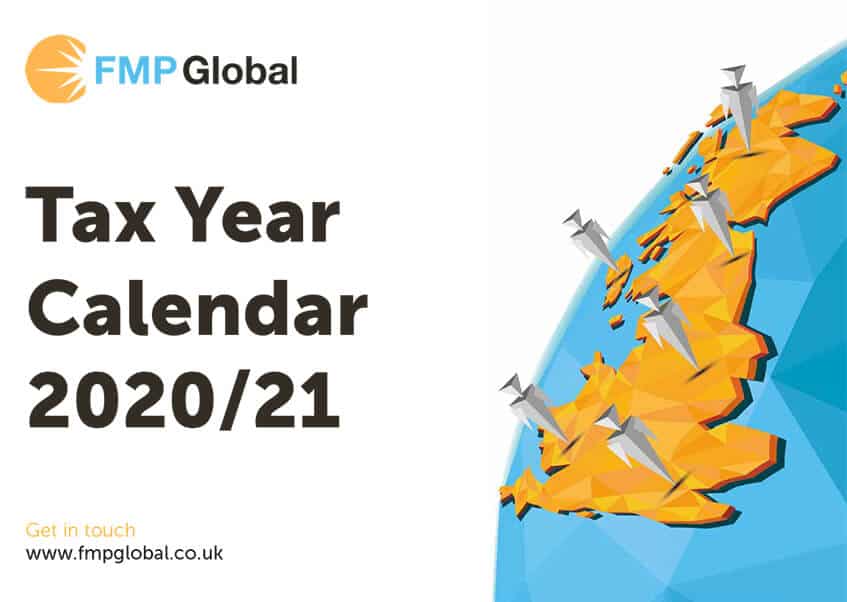
Our UK Tax Calendar is a handy downloadable, free PDF calendar that provides monthly reminders of key deadlines throughout the UK tax year – right up until March 2021.
When is the UK Tax Year 2020-21?
The current UK tax year, also known as the financial year, runs from 6th April 2020 until 5th April 2021.
Important UK Financial Year Dates
Our 2020/21 UK tax calendar includes all the following post and electronic deadlines:
- Payroll submissions
- Monthly PAYE
- Monthly Class 1 NICs
- P60s
- P11Ds
- Self-Assessment Tax forms
What happens if I miss UK tax calendar deadlines?
There are various penalties imposed by HMRC if deadlines are missed, or if you do not pay enough to cover the correct amount.
Late payroll submissions
Your Full Payment Submissions (FPS) should be submitted before your employee’s payday. If this is not the case, and your submission will be late, you must declare the reason in the ‘Late reporting reason’ field of the form. This reason will also determine when you should submit the report.
If HMRC disagrees with your reason, or you have not submitted an FPS declaring the reason, they may charge you a penalty. Your first late submission in the tax year will be disregarded, however, after this, there will be a monthly penalty determined by the number of employees you have;
- 1 to 9 employees – £100 per month late
- 10 to 49 employees – £200 per month late
- 50 – 249 employees – £300 per month late
- 250+ employees – £400 per month late
Penalty notices are sent once per quarter, and you will have 30 days to pay the charge or appeal it.
Missing PAYE & NIC payments
According to the UK government website, late payment penalties will be imposed from the second late payment of PAYE/NIC in one year (the first late payment is overlooked). The penalty charged is a percentage of the amount that should have been paid. This increases with the number of late payments in one year;
- 1 to 3 late payments – 1%
- 4 to 6 late payments – 2%
- 7 to 9 late payments – 3%
- 10+ late payments – 4%
Daily interest will be added to these amounts until the payment is made. If a monthly or quarterly payment remains outstanding after six months, an additional 5% of the amount outstanding will also be charged. This will be incurred again after another six months.
Employers will be alerted of late payment charges by HMRC and will have 30 days to make the payment, as well as a chance to appeal the penalty.
Late giving employees P60s
By law, employers must give their employees a P60 at the end of every tax year. The deadline for this is 31st May, and if this is missed, HMRC has the right to penalise employers with a £300 initial fine, plus additional charges of around £60 per day after the deadline passes. Employers are unlikely to be liable to pay fines if they can prove they are trying to rectify the problem.
Late filing P11Ds
A penalty of £100 per every 50 employees will be charged by HMRC for each month – or part month – that a P11D(b) has not been filed with them.
What is a P11D and who needs one?
P11D forms are used to declare expenses and benefits given to employees, to the government. This is because it might be necessary to pay tax and National Insurance charges on them. Benefits and expenses that count include:
- Company car
- Health benefits
- Childcare
- Travel/entertainment expenses
Employers must submit P11Ds for employees who have received such benefits. Employers must also submit a P11D(b) if they have submitted any P11Ds, employee expenses and benefits have been paid through payroll, and/or you have been requested to do so by HMRC.
Who has to submit and pay a tax Self Assessment in the UK?
Anyone who does not automatically pay tax as part of their salary or wages as an employee needs to complete a tax Self Assessment and pay taxes to HMRC. This could be any of the following people:
- Self-employed individuals (earning more than £1,000 annually)
- Partners in a business
- Those earning money from property rental
- Anyone with a foreign income
- Those earning money from investments
The purpose of the Self Assessment is to declare your earnings and outgoings, and determine how much tax must be paid to the government.
What are the penalties for not submitting a tax Self Assessment?
Tax Self Assessment forms and payments are due once or twice annually, and penalties will be incurred for late submissions. If your tax return is up to three months late, you will be charged £100, and the amount will increase as more time goes on. HMRC offers a late payment penalty calculator to help you find out what you will be charged.


